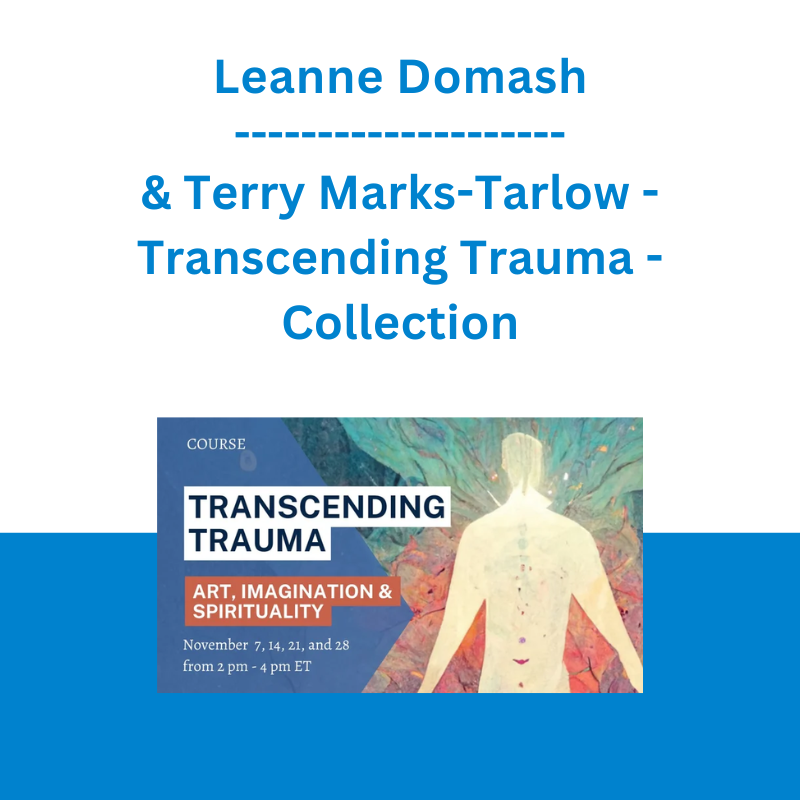*** Proof of Product ***
Exploring the Essential Features of “Leanne Domash & Terry Marks-Tarlow – Transcending Trauma: Art, Imagination & Spirituality – Collection”
About
Course Description
Trauma can easily evoke intense feelings that are difficult to speak about. The arts are extremely useful for approaching hard topics. They add possibilities for embodied healing, aesthetic value, and needed emotional distance. They soften taboo topics in ways that direct discussion cannot.
This course offers clinical examples and various suggestions for how to use the arts, imagination, and spirituality to support sufferers of trauma. We draw upon various modalities, including dreamwork, improvisation, theater, visual arts, I-Thou presence, fractal interconnection, and other spiritual avenues.
Module 1: Transforming Trauma through Art
Historically, the arts may have evolved from the healing and growth-promoting elements of the mother/child relationship. Psychoanalyst Donald Winnicott believed the origin of self, symbol, and culture came from the transitional space between mother and baby. The arts are inherently transformational, not only for the artist but also for the viewer. They introduce universal problems, helping us to feel less alone and isolated with our traumas. As we identify with an image in a painting or a character on stage, we gain the aesthetic distance to address the unspeakable and ponder possible solutions. This module explores the use of theater, film, coloring books, graphic novels, and art creation and exhibition for addressing trauma.
Module 2: Using Dreamwork to Address Conflict
According to Freud, dreams are the royal road to the unconscious. Modern researchers suggest the unconscious contains a wellspring of early memories, both verbal and nonverbal, which we can access and rework. A creative state of mind, dreaming provides portals into previously untapped wisdom. We consolidate memory and learning and form novel associations and connections, often leading to breakthroughs and “aha moments.” This module presents an innovative form of dreamwork called “Embodied Imagination,” which is useful not only for sufferers of trauma but also for anyone wishing to expand creatively. We demonstrate the technique itself through a video presentation and provide enough specifics for experimenting yourself, whether inside or outside of psychotherapy.
Module 3: The Healing Power of Metaphor & Poetry
The foundation of imagination is metaphor. Metaphor helps develop empathy by playing with similarities and differences between self and other. Metaphor lends flexibility to distinguish past from present, helping people emerge from trauma. Metaphor reframes current circumstances and facilitates discovery of novel solutions. Daniel Stern suggested that central metaphors lie at the heart of every clinical case, where they not only reveal core problems, but also pathways toward solutions. Poetry formalizes metaphor to soften mental pain, develop emotional regulation, promote self-reflection, aid in mourning, and accept disavowed aspects of self. This module gives numerous case examples of how to use metaphor and poetry as healing tools.
Module 4: Transcendence and Spirituality
This module concentrates on cultivating relationships and spiritual practices to honor one another and provide sacred spaces, rituals, and support for trauma sufferers. Trauma often emerges from the I-It mentality of using people as instruments. We contrast Martin Buber’s notion of I-Thou relationships with the I-It relationships of the marketplace. We introduce the creation of alters and breath practices from yogic traditions. We introduce an organic fractal framework of full interconnection and interpenetration where boundaries are blurred: I am in you, and you are in me. Meanwhile, the universe is full of uncanny resonances and unconscious communications between people.
Participants in this course will learn:
Understand the value of art and imagery for softening defenses while addressing psychological conflicts;
Understand somatic signs of hyperarousal and dissociation;
Gather techniques to provide sacred spaces, rituals, and support for trauma sufferers;
Learn the transpersonal power of dreams;
Discover the value of embodied dreamwork for addressing trauma and empowering the self;
Learn the relevance of fractals for repetitive patterns, both dysfunctional and functional;
Experience how fractals provide an entry into the spiritual realm;
Discover the potential for synchronicity and other uncanny occurrences under high arousal conditions.
Author
Leanne Domash & Terry Marks-Tarlow
Leanne Domash, PhD is a psychologist/psychoanalyst, playwright and Embodied Imagination practitioner. She has had a life-long interest in the creative process and has written and/or presented nationally and internationally on art, architecture, writing, wit and humor, theater, and spirituality as they intersect with the psychotherapeutic process. She recently published “Imagination, Creativity and Spirituality: Welcome to Wonderland” (Routledge, 2021).
Leanne is Clinical Consultant, New York University Postdoctoral Program in Psychotherapy and Psychoanalysis; Voluntary Psychologist, Mount Sinai Beth Israel Medical Center, NY, NY; and Associate Clinical Professor of Psychiatry, Icahn School of Medicine at Mount Sinai, NY, NY.
Terry Marks-Tarlow, PhD, is an Adjunct Professor at Pacifica Graduate Institute and at California Institute for Integral Studies, and a Core Faculty member of the Insight Center, Los Angeles. Dr. Marks-Tarlow has authored and co-edited numerous books, including The Eel & the Blowfish: A Graphic Novel of Dreams, Trauma & Healing (2022, IPBooks), Mythic Imagination Today (2020, Brill), A Fractal Epistemology for a Scientific Psychology (2020, Cambridge Scholars), Play and Creativity in Psychotherapy (2018, Norton), Truly Mindful Coloring (2016, PESI), Awakening Clinical Intuition (2014, Norton), and Clinical Intuition in Psychotherapy (2012, Norton), and Psyche’s Veil (2008, Routledge), all of which she has illustrated herself. Dr. Marks-Tarlow has presented workshops and seminars internationally and nationally, including a 2012 conference at the Tavistock Institute in London relating to her second book, Psyches Veil, on nonlinear dynamics, and the 2015 UCLA Interpersonal Neurobiology Conference. She was awarded by the Los Angeles County Psychology Association their highest honor: Distinguished Service to the Field of Psychology. Her book, Awakening Clinical Intuition, also recently received the Gradiva Nomination for Best Book.
Please see the full list of alternative group-buy courses available here: https://lunacourse.com/shop/










 Trade Like Mike - The TLM Playbook 2022
Trade Like Mike - The TLM Playbook 2022